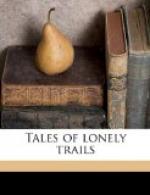“Just about all in, Haught,” I replied, as we shook hands.
Then Copple appeared, swaggering out of the aspens. He was the man I met in Payson and who so kindly had made me take his rifle. I had engaged him also for this hunt. A brawny man he was, with powerful shoulders, swarthy-skinned, and dark-eyed, looking indeed the Indian blood he claimed.
“Wouldn’t have recognized you anywhere’s else,” he said.
These keen-eyed outdoor men at a glance saw the havoc work and pain had played with me. They were solicitous, and when I explained my condition they made light of that, and showed relief that I was not ill. “Saw wood an’ rustle around,” said Haught. And Copple said: “He needs venison an’ bear meat.”
They rode back with us up to the wagons. Copple had been a freighter. He picked out a way to drive down into the canyon. So rough and steep it was that I did not believe driving down would be possible. But with axes and pick and shovel, and a heaving of rocks, they worked a road that Lee drove down. Some places were almost straight down. But the ground was soft, hoofs and wheels sank deeply, and though one wagon lurched almost over, and the heavily laden chuck-wagon almost hurdled the team, Lee made the bad places without accident. Two hours after our arrival, such was the labor of many strong hands, we reached our old camp ground. One thing was certain, however, and that was we would never get back up the way we came down.
Except for a luxuriance of grass and ferns, and two babbling streams of water, our old camp ground had not changed. I sat down with mingled emotions. How familiarly beautiful and lonely this canyon glade! The great pines and spruces looked down upon me with a benediction. How serene, passionless, strong they seemed! It was only men who changed in brief time. The long year of worry and dread and toil and pain had passed. It was nothing. On the soft, fragrant, pine-scented breeze came a whispering of welcome from the forestland: “You are here again. Live now—in the present.”
Takahashi beamed upon me: “More better place to camp,” he said, grinning. Already the Jap had won my admiration and liking. His ability excited my interest, and I wanted to know more about him. As to this camp-site being a joy compared to the ones stretched back along the road he was assuredly right. That night we did no more than eat and unroll our beds. But next day there set in the pleasant tasks of unpacking, putting up tents and flies, cutting spruce for thick, soft beds, and a hundred odd jobs dear to every camper. Takahashi would not have any one help him. He dug a wide space for fires, erected a stone windbreak, and made two ovens out of baked mud, the like of which, and the cleverness of which I had never seen. He was a whirlwind for work.




